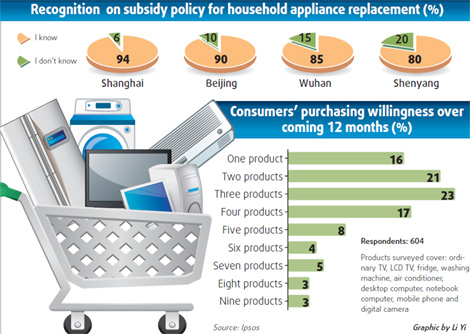In these uncertain times, when deep discounts and clever advertisements have failed to sell merchandise, retailers on the mainland have to count on a more potent force - government subsidies.
And, they sure won't be disappointed.
The results of a recent survey by independent marketing researcher Ipsos have shown at least 25 percent of the respondents in six major cities had changed their minds about purchasing big-ticket electrical appliances to take advantage of the government subsidy program.

The online survey, conducted from June 5 to 16, interviewed 604 people between the ages of 18 and 45 in Beijing, Shanghai, Guangzhou, Wuhan, Chengdu and Shenyang.
In the survey, 59 percent of the respondents said they were motivated by the government subsidy program to buy new household appliances, which they would not have otherwise bought.
The survey also showed that the policy had inspired 26 percent of the respondents to consider trading in their old appliances for new ones.
The government introduced a household appliances trade-in policy last month, giving consumers a 10 percent rebate for trading in their household appliances.
A trial program, involving 2 billion yuan of fiscal expenditure, was kicked off in nine cities and provinces and covered five types of products.
According to the survey, 89 percent of the respondents said they were aware of this subsidy program. Despite the global economic downturn, over 60 percent of those surveyed indicated that they would purchase two to four new household appliances in the coming year, with 99 percent saying they would buy at least one.
Though consumers appreciated the subsidy program, they wanted more products to be included - 77 percent of 536 respondents said they hoped mobile phones would be included in the trade-in policy. Meanwhile, 64 percent, 60 percent and 68 percent of them, respectively, said electric cookware, cameras and water heaters should be included in the rebate policy.
Jia Yanli, deputy director of Ipsos' public affairs research department, told China Daily that the new household appliances replacement subsidy policy offered a direct and tangible boon to consumers, which, combined with the subsidy policy for purchase of home appliances in rural areas, are expected to stimulate demand across the nation.
"It not only, to a great extent, helps strengthen consumer willingness to spend now, but also inspires potential demand," she said.
(China Daily July 8, 2009)